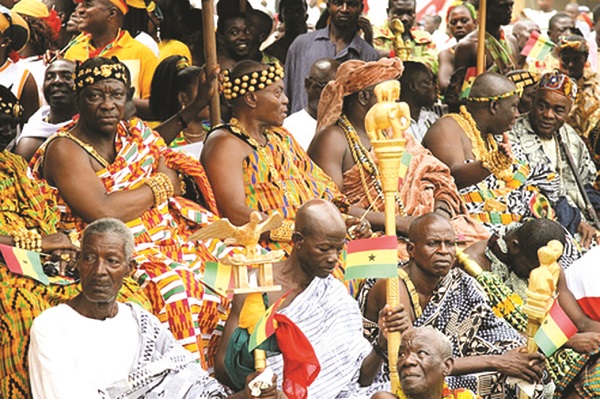
The great disconnect between Ghana’s ancient culture and its current state, sociologically speaking, has been brought into sharp relief by a recent incident in Kumase, the Asante capital. The incident is worth studying because it is likely that its significance has become lost in the midst of both the hypocritical verbiage ns contemptuous unconcern, with which we view matters that elsewhere, could cause the very earth to shake.
Apparently, some chiefs, sἑbe o!– piqued by statements made by a contributor to one of the TV stations that are springing to life across our nation like mushrooms, decided to use sἑbe o!– “traditional” (magical) methods to deal with the offender.
The chiefs also said — sἑbe o!—that the man was no longer welcome in Asante, and they performed customs to bring the spirits of Asanteman upon the head of the offender, should he disobey them and set foot on Asante soil.
I have deliberately left out details of what was said or allegedly done, because I do know the tendency of the Ghanaian media to misreport controversial event.
Not only that – I am also painfully aware that some Ghanaians allow themselves to be influenced by adrenalin to over-react to situations, only to retract what they had done or said, when repercussions inevitably occur.
This happens because many people do not know anything about our customs. This is a pity because; many of us use, on a daily basis, a language that contains an inbuilt escape route for verbal offences. .
For instance, our customs recognise the possibility that someone might make a derogatory comment on an issue, on the basis of a mishearing or misunderstanding of what someone else has said. Our sages coined a proverb to illustrate this:
“Nea ↄkaae ante; nea ↄteeԐ nsoanhunuaseԐ kyerԐ.” [The one who reported what was said didn’t hear what was said well; while the one, who heard it, didn’t understand its meaning].
This is why the elders made it possible to “apologise in advance” for any mistakes one might make whilst speaking. One needs only precede what one is going to say, that might be contentious, with the words, “sԐbe o, tafrakyԐ!”
When one uses these words, one exculpates one’s words of any guilt or contempt that the words might otherwise fetch.
So why did the man who made the statements the Asante chiefs objected to, not employ the well-known formula? Most probably, it’s because he’d not been taught by his elders how to speak in public. Of course, some people are so arrogant or stiff-necked that even if someone had taught him or her a thousand times that speaking in public makes some very serious demands upon our intelligence, trouble would still have ensued from what he or she would have said.
The same is true of those who now proliferate our airwaves, saying whatever comes to their mind. There are, of course, laws of defamation and libel in Ghana, imported from Britain, which come in where our traditional restraints don’t work. But some people think they are kings and they get intoxicated when they are put in front of a microphone.
They may be so illiterate that they don’t know how their words are transported through the air by sound waves. But when it comes to verbiage in relation to content, they are super-masters. The more poisonous what they say is, (they think) the more it would convince the audience. That what the audience wants is not abuse but sweet reason, doesn’t occur to them. If it does, they ignore the thought. Why? Because, in their own eyes, they are bigger than the law, or customs or business sense – all of which are considerations that urge restraint upon the public speaker who knows that his or her words are going to be transmitted to the world electronically.
If the person who attacked the Asante chiefs had allowed himself to observe the proprieties of public speech, he could have contributed a great deal of practical advice to the Government and people of Ghana, with regard to their campaign to try and stop galamsey. Yes, almost every right-thinking person agrees that galamsey is destroying our drinking water. In ancient times, our elders would have summoned their chiefs one by one and asked them, “Na enti, ensuo an yԐnomyi, ne pↄtↄpↄtↄ sei, sԐbe, monniani an yԐdebehuo?” [And so, haven’t you (– apologies in advance! –) got eyes to see that the water we drink has become polluted and muddy?]
Each chief would have to answer questions in public regarding the state of the water:
“Is it not true that the chairman of Party X came and saw you one night and you (apologies) called some people together secretly and (apologies) asked them to allow the chairman to bring some excavators to seek gold in River Asomasi? Did you not (apologies) tell the police chief in the district not to interfere with the project because you, the chief, and the owners of the land had given permission for the chairman to bring the excavators? Did you not say to the police chief (apologies) that since he came from the area himself, he would have seen that these days, the cocoa harvests are not so good and that people need some other sources of income?”
The questioning would have gone on and on, with every member of the public allowed to have his or her say. And so long as they used the correct language, no-one would have the slightest thing to fear. Indeed, each chief would invite destoolment, if he took umbrage with his people for daring to question him on the issue. The chief would, of course, be able to deny that he had played any role in getting the lands and rivers of his area to be devastated by galamsey operators. But someone might possess real evidence and reveal it to the public – for instance, someone might have led the chairman to chief’s palace; or the chief might have mentioned the matter to one of his sub-chiefs and forgotten that this guy is no longer on speaking terms with him.
Of course, these days, chieftaincy doesn’t work like it used to do. In the olden days, the code of honour among chiefs was so strict that if one was exposed as having done really disgraceful things against his community, he would commit suicide. And these days, if a chief’s own people do rise up against him, he could conceivably be saved by sἑbe o! — his mates in the Houses of Chiefs.
It is — sἑbe o! — because some chiefs do feel so impregnable that they have collaborated with galamseyers to bring Ghana to the brink of absolute disaster. Soon, if one does not have money to buy sachet water, one cannot get safe water to drink, or cook with, or wash one’s clothing.
By Cameron Duodu



